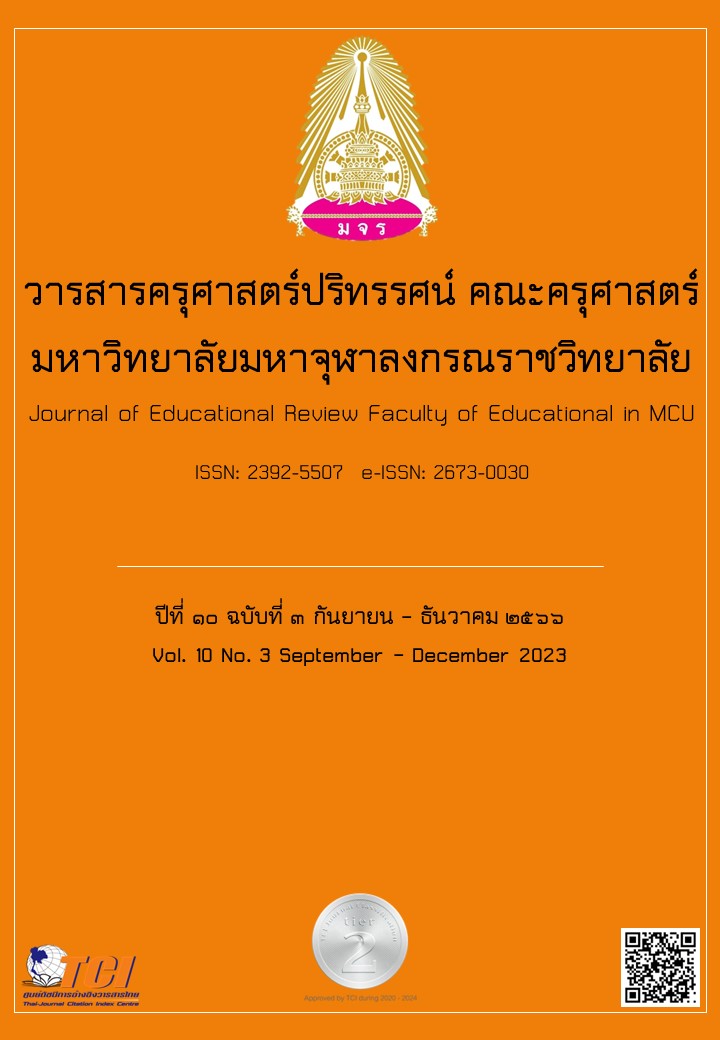THE PIORITY NEEDS OF PRIVATE PRIMARY SCHOOL MANAGEMENT BASED ON CAREER FUTURE SKILL COCEPT
Main Article Content
Abstract
The purpose of this research was to study the priority needs of private elementary school administration based on the concept of future career skills. The research population was 2,169 private elementary schools under the Office of Private Education. were 338 private elementary schools using a multi-stage random sampling method. The research tools were questionnaires. Data were analyzed using statistics, frequency, mean, percentage, standard deviation. and the required index value The results revealed that the overall priority needs index for school administration was (PNImodified = 0.160) In term of academic administration had sub-elements, measurement and evaluation was the highest index of essential needs (PNImodified = 0.167), curriculum development (PNImodified = 0.165), teaching and learning management (PNImodified = 0.160). While general administration, sub-elements learning space arrangement had the highest index of necessary needs (PNImodified = 0.156) and the provision of technology for education had the lowest order of essential needs index (PNImodified = 0.153). As the result of future career skills, the advanced cognitive skills had the highest index of essential needs (PNImodified = 0.174), followed by physical skills (PNImodified = 0.167), technological skills (PNImodified = 0.161), social and emotional skills (PNImodified = 0.158). Basic (PNImodified = 0.141) had the lowest order of need index value.
Article Details

This work is licensed under a Creative Commons Attribution-NonCommercial-NoDerivatives 4.0 International License.
ทัศนะและความคิดเห็นที่ปรากฏในบทความในวารสารฉบับนี้ถือเป็นความรับผิดชอบของผู้เขียนบทความนั้นเพียงผู้เดียว และไม่ถือเป็นทัศนะและความรับผิดชอบของกองบรรณาธิการ
กองบรรณาธิการขอสงวนสิทธิ์ในการคัดเลือกบทความลงตีพิมพ์และจะแจ้งให้เจ้าของบทความทราบหลังจากผู้ประเมินบทความตรวจอ่านบทความแล้ว
ต้นฉบับที่ได้รับการตีพิมพ์ในวารสารครุศาสตร์ปริทรรศน์ คณะครุศาสตร์ มหาวิทยาลัยมหาจุฬาลงกรณราชวิทยาลัย ถือเป็นกรรมสิทธิ์ของคณะครุศาสตร์ มหาวิทยาลัยมหาจุฬาลงกรณราชวิทยาลัย ห้ามนำข้อความทั้งหมดหรือบางส่วนไปพิมพ์ซ้ำ เว้นเสียแต่ว่าจะได้รับอนุญาตจากมหาวิทยาลัยฯ เป็นลายลักษณ์อักษร
References
กระทรวงศึกษาธิการ. (2546). พระราชบัญญัติการศึกษาแห่งชาติ พ.ศ. 2542 และที่แก้ไขเพิ่มติม (ฉบับที่ 2) พ.ศ. 2545. กรุงเทพมหานคร: อักษรไทย.
ปรียาพร วงศ์อนุตรโรจน์. (2543). การบริหารงานวิชาการ. กรุงเทพมหานคร: สุเนตรฟิล์ม.
รุ่งชัชดาพร เวหะชาติ. (2557). การบริหารจัดการสถานศึกษาขั้นพื้นฐาน. สงขลา: เทมการพิมพ์.
วัฒนา โรจน์เจริญชัย. (2553). การบริหารงานวิชาการโดยใช้โรงเรียนเป็นฐานของสถานศึกษาในกลุ่มเครือข่ายพัฒนาคุณภาพการศึกษาเบญจมิตร อำเภอแม่แจ่ม จังหวัดเชียงใหม่. การค้นคว้าแบบอิสระศึกษาศาสตรมหาบัณฑิต. มหาวิทยาลัยเชียงใหม่.
สถาบันส่งเสริมการสอนวิทยาศาสตร์ และเทคโนโลยี. (2562). การแถลงผลการประเมิน PISA 2018. แหล่งที่มา https://pisathailand.ipst.ac.th/news-12/ สืบค้นเมื่อ 19 ส.ค. 2563.
สำนักงานคณะกรรมการพัฒนาเศรษฐกิจและสังคม. (2560). แผนพัฒนาเศรษฐกิจและสังคมแห่งชาติ ฉบับที่ 12 (พ.ศ. 2560-2564). แหล่งที่มา https://www.nesdc.go.th/ewt_dl_link.php?nid=8309&filename=index สืบค้นเมื่อ 1 ส.ค. 2561.
สำนักงานเลขาธิการสภาการศึกษา. (2561). มาตรฐานการศึกษาชาติ พ.ศ. 2561. กรุงเทพมหานคร: 21 เซ็นจุรี่.
สุนทร โคตรบรรเทา. (2551). หลักการและทฤษฎีการบริหารการศึกษา. กรุงเทพมหานคร: ปัญญาธน.
Alex Grey. (2016). Future of Jobs. From https://www.weforum.org/agenda/2016/01/the-10-skills-you-need-to-thrive-in-the-fourth-industrial-revolution/ Retrieved January 12, 2021.
Anna Davies, D Devin Fidler, Marina Gorbis. (2011). Future Work Skill 2020. From http://www.iftf.org/uploads/media/SR-1382A_UPRI_future_work_skills_sm.pdf Retrieved December 2, 2020.
Bakhshi, H. et al. (2017). Future of Skills Employment in 2030. From https://www.nesta.org.uk/sites/default/files/the_future_of_skills_employment_in_2030_0.pdf Retrieved October 22, 2020.
OECD. (2018). Skills for 2030. From https://www.oecd.org/education/2030-project/teaching-and-learning/learning/skills/Skills_for_2030_concept_note.pdf019 Retrieved November 22, 2020.
Taro Yamane. (1973). Statistics: an introductory analysis. New York: Harper & Row.
World Economic Forum. (2023). World Economic Forum Annual Meeting. From https://www.weforum.org/events/world-economic-forum-annual-meeting-2023 Retrieved February 5, 2023.


